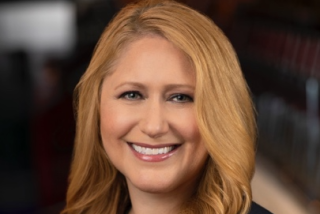More than an anchor; a rudder
- Share via
NEW YORK — The first message was posted just six minutes after the news broke Tuesday that ABC anchor Peter Jennings had been diagnosed with lung cancer. By the end of the week, more than 3,400 e-mails offering him prayers and good wishes had filled the network’s online message board -- many of them expressing an intensely personal sense of grief.
“Our old and trusted friend, you have looked out for all of us for so long, and comforted us in our time of need,” wrote Peggi and Ron Barratt. “Please take the time to now look out for yourself.”
While the announcement of Jennings’ illness hit the already unsettled world of network news with even more turbulence, it also jolted television viewers, stripping them -- at least for a time -- of the last of the three familiar faces that had anchored the evening news for the last two decades.
Jennings still hopes to lead the newscast throughout his chemotherapy. But he was unable to deliver the news last week because of a hoarse voice, and it remains unclear how frequently he will be on the air.
Viewer reaction to his illness underscored the challenge facing the networks as they usher in a new generation of evening news anchors: replicating the strong bonds that have developed between audiences and the iconic faces of ABC, NBC and CBS.
“The illusion that television has created is that we experience events, and the people that bring us through, that are our guides, are the network anchors,” said Gary Edgerton, a professor at Old Dominion University in Norfolk, Va., and co-editor of the Journal of Popular Film and Television. “We have these really intense, interpersonal connections with these stars.”
NBC eased the transition from Tom Brokaw to Brian Williams in December by announcing the move two years ahead of time and giving viewers ample opportunities to watch Williams as a substitute anchor. CBS tapped a veteran newsman, Bob Schieffer, to temporarily replace Dan Rather when he left the newscast last month.
Next up?
Jennings’ diagnosis forces ABC executives to begin contemplating the question of succession too -- a matter most had assumed would be at least several years off.
“It signals the transition that ABC inevitably is going to have to make,” said Charles Bierbauer, a former CNN and ABC correspondent who serves as dean of the University of South Carolina’s College of Mass Communications and Information Studies. “The simple fact is that the generation is changing.”
But transferring viewer affection to new anchors is not a simple matter, media experts said.
“These are the type of interactions that have to be developed over time,” said Jeffrey McCall, a professor of communications at Depauw University in Greencastle, Ind., who noted that competitive pressures from all-news cable channels, the Internet and other news sources limit the amount of time new anchors now have to bond with their audiences.
“Network news is in a big pickle,” he added. “They can’t afford to let whoever takes over the time to grow into the role.”
Some executives actually view the turnover as an opportunity to radically remake the broadcasts in hopes of appealing to a younger demographic.
CBS Chairman and Chief Executive Leslie Moonves has called the traditional “voice of God” anchor an antiquated concept and suggested that his network may roll out a more irreverent, multi-anchor format.
“Those days are over where you have that guy sitting behind the desk that everybody believes to the nth degree,” he told reporters in January.
But TV news correspondent and anchor Morton Dean dismissed the idea that audiences no longer seek that kind of relationship. “I think it’s a mistake for anybody to think anchors are no longer as important as they once were, because when there’s a crisis in America, or affecting America, people turn to someone they trust,” said Dean, who worked at CBS and ABC. The audience for the three major evening newscasts has shrunk considerably amid growing competition, yet they still combine to attract upward of 26 million people each weeknight.
Indeed, there was ample evidence last week that viewers greatly value the intimacy and confidence they have felt with Jennings, who has anchored “World News Tonight” for 22 years. ABC’s website was flooded with emotional testimonials from people about his effect on their lives, many referring to him as a member of the family.
An Ohio mother said she and her children say, “Good night, Peter” every night after the newscast. A college student wrote that she doesn’t miss his broadcasts because she used to watch it nightly with her father.
Viewer after viewer cited Jennings’ handling of coverage of the Sept. 11 attacks as a welcome balm during a horrific day. A second-grade teacher from Wilmington, N. C., said Jennings’ demeanor “gave your viewers a sense of peace, that everything would eventually be better than it was at that moment” and helped “explain the unexplainable to our children.” A Cincinnati viewer wrote that “when the nation circles its wagons, you are the wagon master that provides us with a sense of calm.”
“Life won’t be the same till you’re back in the living rooms of America every night,” wrote a woman identified as Marilyn L.
Stuart Fischoff, a professor emeritus of media psychology at Cal State Los Angeles, said he is not surprised by the emotional responses to Jennings’ absence from the newscast last week.
‘Rootless’
“There is research that shows when you remove pivotal people on television from a person’s daily life, they feel like they’ve had a death in the family,” he said. “They feel rootless.”
ABC executives stress that Jennings is still the anchor of “World News Tonight” and will do the broadcast whenever he feels up to it. When he can’t, he still plans to exert a strong force in shaping the newscast.
“We are enormously grateful for the loyalty of our audience, and we expect they will continue to get their news from Peter Jennings,” said ABC News spokesman Jeffrey Schneider. “Nights when they don’t see him physically on the air, they know his steady hand is on the tiller.”
Schneider insisted that ABC executives are focused on Jennings’ recovery. But TV news veterans said the network must consider who will take over if Jennings is unable to continue, a transition that had not been anticipated for some time.
“Not only did they not want to, they didn’t expect they would have to,” said Robert Zelnick, chairman of Boston University’s department of journalism and a former ABC News correspondent. “These were going to be Peter Jennings’ golden years.”
Charles Gibson, co-host of “Good Morning America,” and “20/20” co-anchor Elizabeth Vargas, who are filling in for Jennings temporarily, are considered possible permanent replacements for the longtime anchor, along with “World News Tonight Saturday” anchor Bob Woodruff and chief White House correspondent Terry Moran.
But Zelnick said it would be hard to find an adequate replacement. “This is a body blow to ABC and to aficionados of evening news,” he added. “I’ve been walking around for days feeling a lump of sadness. He’s been such a big part of our lives.”
More to Read
The biggest entertainment stories
Get our big stories about Hollywood, film, television, music, arts, culture and more right in your inbox as soon as they publish.
You may occasionally receive promotional content from the Los Angeles Times.










